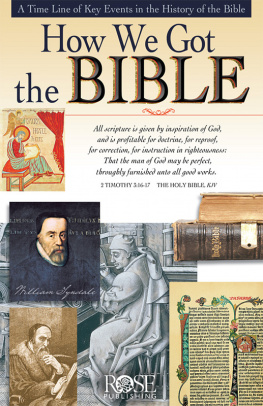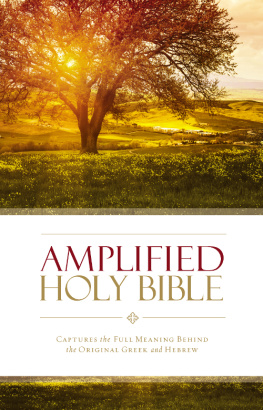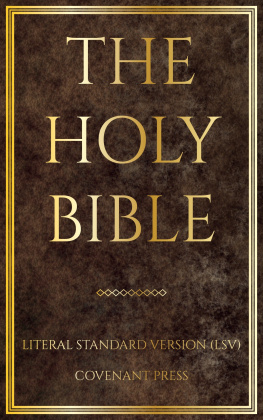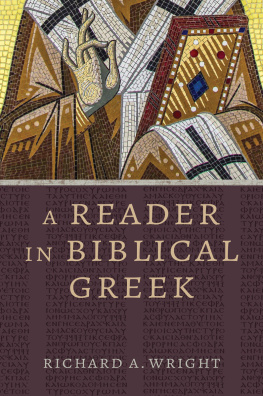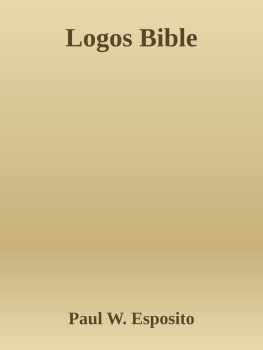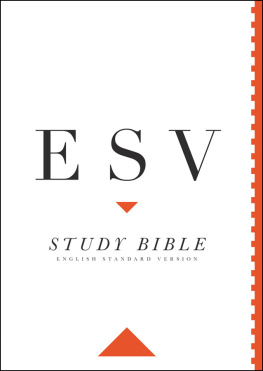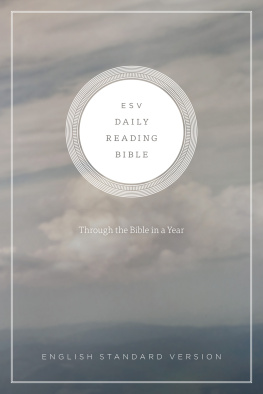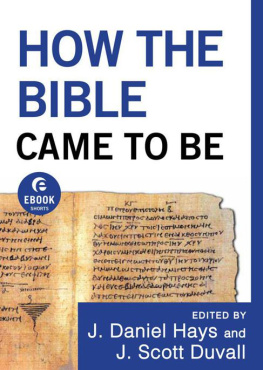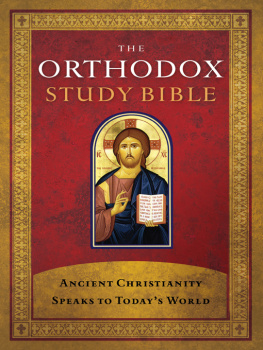When God Spoke Greek
WHEN GOD
SPOKE GREEK
The Septuagint and the Making of the
Christian Bible

TIMOTHY MICHAEL LAW


Oxford University Press is a department of the University of Oxford.
It furthers the Universitys objective of excellence in research, scholarship,
and education by publishing worldwide.
Oxford New York
Auckland Cape Town Dar es Salaam Hong Kong Karachi
Kuala Lumpur Madrid Melbourne Mexico City Nairobi
New Delhi Shanghai Taipei Toronto
With offices in
Argentina Austria Brazil Chile Czech Republic France Greece
Guatemala Hungary Italy Japan Poland Portugal Singapore
South Korea Switzerland Thailand Turkey Ukraine Vietnam
Oxford is a registered trademark of Oxford University Press
in the UK and certain other countries.
Published in the United States of America by
Oxford University Press
198 Madison Avenue, New York, NY 10016
Oxford University Press 2013
All rights reserved. No part of this publication may be reproduced, stored in a
retrieval system, or transmitted, in any form or by any means, without the prior
permission in writing of Oxford University Press, or as expressly permitted by law,
by license, or under terms agreed with the appropriate reproduction rights organization.
Inquiries concerning reproduction outside the scope of the above should be sent to the
Rights Department, Oxford University Press, at the address above.
You must not circulate this work in any other form
and you must impose this same condition on any acquirer.
Library of Congress Cataloging-in-Publication Data
Law, T. M. (Timothy Michael), 1979
When God spoke Greek : the Septuagint and the making of the Christian
Bible / Timothy Michael Law.
pages cm
Includes bibliographical references and index.
ISBN 9780199781720 (pbk. : alk. paper) ISBN 9780199781713
(cloth : alk. paper)
1. Bible. O.T. GreekVersionsSeptuagint. 2. Bible. N.T.Criticism,
interpretation, etc. 3. Bible. O.T. GreekHistory. 4. Bible.
O.T.InfluenceCivilization, Western. I. Title.
BS744.L39 2013
221.48dc23
2012045781
1 3 5 7 9 8 6 4 2
Printed in the United States of America
on acid-free paper
To Elizabeth Rose,
whose life was just beginning
when I wrote the first word in this book
I AM INDEBTED to many colleagues and friends who encouraged me along the way, and in particular to Alison Salvesen and her family. I wake up each morning eager to work with my Marginalia family, the most creative and exciting people with whom Ive ever partnered. David Lincicum, Jacob Wright, and Charles Halton are daily e-conversation partners. I am also in debt to Joel Watts, who efficiently prepared the index; to Christopher M. Hays for his advice on many points; and to Faimon Roberts and Kyle McDaniel, who for some reason care about what I write. One more mention should be made of my first friends in Germany, where I finished this book, who are special to me because they enthusiastically cheered me on to the finish line: Richard, Sana, Marrija, Svetlana, Kevin (ABBQB), Estefana, Katarina, and Zyad. Finally, highest gratitude is reserved for my wife and daughter. They were proud of this book from the first day, and it is appropriately dedicated to my Elizabeth.
@TMichaelLaw
April 4, 2013
Gttingen
When God Spoke Greek
1
Why This Book?
YOU HAVE PROBABLY encountered the Septuagint already. You may never have heard of it, but the Septuagint will have made its way to you if you have read or so much as glanced at a Bible. The names of some of the books in the Old Testament come from titles given to these books in Septuagint manuscripts: genesis is the Greek word for beginning, exodos for going out, leuitikon notes the book contains material about the Levites, and deuteronomion comes from the Greek translators interpretation of Deuteronomy 17:18, which in Hebrew reads a copy of this teaching but which the translator understood to mean a repetition of the Law. He thus translated this phrase second Law, which is the meaning of Deuteronomion or, as we know it, Deuteronomy. The beloved childrens story of Josephs coat of many colors is also found in the Septuagint. In Genesis 37:3, the Hebrew Bible indicates that Joseph wore a coat that covered his arms and legs and was in some ways ornamented, but the Septuagint and later the Latin Vulgate describe the coat as multicolored. Footnotes in modern English versions also mention the Greek Old Testament where the translation committee believed the Septuagint offered a better reading than the Hebrew Bible upon which the English is for the most part based. Neither have readers of the New Testament escaped the Septuagints reach. Apart from the numerous quotations of the Old Testament in the New, which were almost entirely from the Greek, the language and theology of the New Testament writers are indebted far more to the Septuagint than to the Hebrew Bible. Consequently, the Septuagint plays a critical role in the history of Christian theology and exegesis.
Every week millions of the faithful around the world gather to teach, to read, and to hear the Bible. Although Christians have always found it difficult to know how the Jewish scriptures they call Old Testament are relevant, they are familiar with the famous stories of creation, flood, and wilderness sojourning; with characters like Noah, Moses, Abraham, and Ezekiel; and with events like the Golden Calf episode, Israels conquest of the Promised Land, and David versus Goliath. Yet fewer will have reflected on how these stories came into being or how the biblical books as we know them were formed. At best, many readers of this tremendous book we now call the Bible assume that writers like Jeremiah sat down one sunny afternoon and jotted down his prophecy, dispatched it, and then went about his way. But the biblical books were formed after a long process of accumulation, combination, and reformulation of other sources. For a long time it was easy to discard these explanations as examples of navel-gazing in the academy or, worse, of the designs of unbelieving scholars to destroy the believers confidence in the Bible. The theories of the prehistory of the biblical texts were based largely on the scholars intuition from close reading, but there was no tangible proof in the form of textual artifacts in Hebrew. Only one manuscript tradition of the Hebrew scriptures existed, and it matched the Hebrew Bible of modern editions and therefore the modern English translations. In the absence of Hebrew sources to verify their hypotheses, scholars pointed to the ancient versions of the Hebrew Bible. The Greek translation known as the Septuagint was central to the discussion, since numerous passages stood at odds with the Hebrew. Commentators suggested that the Septuagint illuminates a lost part of the history of the formation of the Old Testament, that the Greek translation actually shows us different stages of the Hebrew text long before it reached its final form. Nonetheless, since the authoritative text for Protestant churches has been the Hebrew Bible for half a millennium, it was easy for many to dismiss these hypotheses and to imagine instead that the Hebrew Bible found in the medieval manuscripts, and now in a modern edition easily purchased in a bookshop, came from the pens of the biblical authors. The divergences noted in the Septuagint could be explained easily: the translators were creative or they didnt understand the Hebrew before them, but the Greek translation in no way provides evidence of another form of the Hebrew text in antiquity. There was only ever one.
Next page


